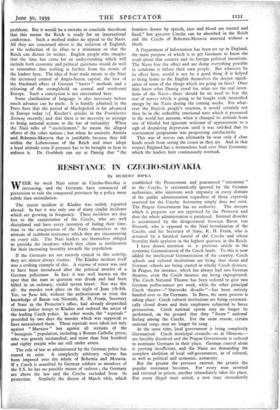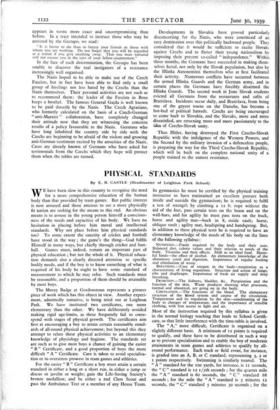RESISTANCE IN CZECHO-SLOVAKIA
By HUBERT RIPKA
WEEK by week Nazi terror in Czecho-Slovakia is increasing, and the Germans have renounced all pretension to rule the conquered provinces by a policy more subtle than intimidation.
The recent incident at Kladno was widely reported abroad. In fact it was only one of many similar incidents which are growing in frequency. These incidents are due less to the exasperation of the Czechs, who are well disciplined and have every intention of biding their time, than to the exasperation of the Nazis themselves at the attitude of stubborn resistance which they are encountering on every side. The Nazi leaders are themselves obliged to provoke the incidents which they claim as justification for their increasing brutality towards the population.
If the Germans are not entirely cynical in this activity, they are almost always clumsy. The Kladno incident itself was a striking example of this. A regime of terror was said to have been introduced after the political murder of a German policeman. In fact, it was well known on the spot that the man in question was drunk and had been killed in an ordinary, sordid tavern brawl. Nor was this all: the murder took place on the night of June 7th-8th. Yet, on June 6th, without the authorisation or even the knowledge of Baron von Neurath, K. H. Frank, Secretary of State in the Protector's office, had already despatched German police troops to Kladno and ordered the arrest of the leading Czech police. In other words, the " reprisals " preceded by two days the murder which was supposed to have necessitated them. These reprisals were taken not only against " Marxists " but against all sections of the " bourgeois " population, including a Roman Catholic priest, who was gravely mishandled, and more than four hundred and eighty people who are still under arrest.
The rule of law as administered by the German police has ceased to exist. A completely arbitrary regime has been imposed over the whole of Bohemia and Moravia. If a Czech is assaulted by German soldiers or members of the S.S. he has no possible means of redress ; the Germans are above the law and the Czechs excluded from its protection. Similarly the decree of March 16th, which established the Protectorate and guaranteed " autonomy " to the Czechs, is systematically ignored by the German authorities, who intervene with impunity in every domain of the public administration regardless of those expressly reserved for the Czechs. Autonomy simply does not exist. The Prague Government has no authority. The decrees which it prepares are not approved by the Protector and thus the whole administration is paralysed. Internal disorder is accentuated by the disagreement between Baron von Neurath, who is opposed to the Nazi brutalisation of the Czechs, and his Secretary of State, K. H. Frank, who is actuated by a fanatical hatred of the Czechs and whose brutality finds applause in the highest quarters in the Reich.
I have drawn attention in a previous article to the economic Germanisation of the Czech lands. To this is now added the intellectual Germanisation of the country. Czech schools and cultural institutions are being shut down and German schools are being started in wholly Czech districts. In Prague, for instance, which has always had two German theatres, even the Czech theatres are being expropriated. The Czech National Theatre has been ordered to give two German performances per week, while the other principal Czech theatre—" Stavovske divadlo "—has been entirely handed over to the Germans. In Brno, the same process is taking place: Czech cultural institutions are being systemati- cally closed down and their employees subjected to fierce persecution. Czech national operas may no longer be performed, on the ground that they " foster " national feeling among the Czechs. For the same reason, certain national songs may no longer be sung.
At the same time, local government is being completely Germanised. Czech municipal councils—as at Olomonc- are forcibly dissolved and the Prague Government is ordered to nominate Germans in their place. German control alone is proving insufficient, and the Nazis are demanding the complete abolition of local self-government, as of cultural, as well as political and economic, autonomy.
But the greater the pressure exerted, the greater the popular resistance becomes. For every man arrested and tortured in prison, another immediately takes his place. For every illegal tract seized, a new tract immediately appears in terms more exact and uncompromising than before. In a tract intended to instruct those who may be arrested by the Gestapo, we read : " It is better to die than to betray your friends or those with whom you are working. Do not forget that you will be regarded as a traitor if you give anything away. That you were tortured will not excuse you in the eyes of your fellow-countrymen."
In the face of such determination, the Gestapo has been unable to discover the real instigators of a resistance increasingly well organised.
The Nazis hoped to be able to make use of the Czech Fascists, but in fact have been able to find only a small group of hirelings not less hated by the Czechs than the Nazis themselves. Their personal activities are not such as to recommend them: the leader of the Fascists in Brno keeps a brothel. The famous General Gajda is well known to be paid directly by the Nazis. The Czech Agrarians, who formerly calculated on the basis of a Czech-German " anti-Marxist " collaboration, have completely changed their attitude now that they are witnessing the concrete results of a policy favourable to the Nazis. Germans who have long inhabited the country side by side with the Czechs are beginning to be afraid of the violent and growing anti-German sentiment excited by the atrocities of the Nazis. Cases are already known of Germans who have asked for testimonials from the Czechs which they hope will protect them when the tables are turned. Developments in Slovakia have proved particularly disconcerting for the Nazis, who were convinced of an easy domination over this politically backward people. They considered that it would be sufficient to excite Slovaks against Czechs and to flatter their young nationalism by imposing their present so-called " independence." Within three months, the Germans have succeeded in making them- selves hated, not only by the Slovak population, but also by the Hlinka Autonomists themselves who at first facilitated their activity. Numerous conflicts have occurred between the armed Hlinka Guards and the German army, and in certain places the Germans have forcibly disarmed the Hlinka Guards. The second week in June Slovak students evicted all Germans from the restaurants and cafes of Bratislava. Incidents occur daily, and Bratislava, from being one of the gayest towns on the Danube, has become a hot-bed of political hatreds. Czechs are being encouraged to come back to Slovakia, and the Slovaks, more and more dissatisfied, are returning more and more passionately to the idea of Czecho-Slovak unity.
Thus Hitler, having destroyed the First Czecho-Slovak Republic with the indulgence of the Western Powers, and the Second by the military invasion of a defenceless people, is preparing the way for the Third Czecho-Slovak Republic, which will be built on the complete national unity of a people trained to the utmost resistance.











































 Previous page
Previous page